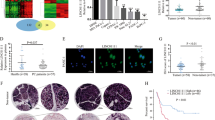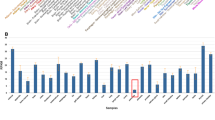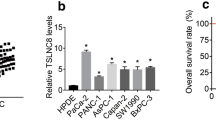Abstract
Long non-coding RNA (lncRNA) modulates gene expression, while lncRNA dysregulation is associated with human cancer. Furthermore, while recent studies have shown that lncRNA IRAIN plays an important role in other malignancies, the role of IRAIN in pancreatic cancer (PC) progression remains unclear. In this study, we found that upregulation of lncRNA IRAIN was significantly correlated with tumor size, TNM stage, and lymph node metastasis in a cohort of 37 PC patients. In vitro experiments showed that knockdown of IRAIN by small interfering RNA (siRNA) significantly induced cell apoptosis and inhibited cell proliferation in both BxPC-3 and PANC-1 cells. Further mechanism study showed that, by binding to histone demethylase lysine-specific demethylase 1 (LSD1), an enhancer of zeste homolog 2 (EZH2), IRAIN reduced PC tumor cell apoptosis and induced growth arrest by silencing the expression of Kruppel-like factor 2 (KLF2) and P15. Moreover, IRAIN expression was inversely correlated with that of KLF2 and P15 in PC tissues. To our knowledge, this is the first report elucidating the role and mechanism of IRAIN in PC progression.






Similar content being viewed by others
References
Siegel RL, Miller KD, Jemal A. Cancer statistics, 2015. CA Cancer J Clin. 2015;65(1):5–29.
Hussain SP. Pancreatic cancer: current progress and future challenges. Int J Biol Sci. 2016;12(3):270–2.
Wolfgang CL et al. Recent progress in pancreatic cancer. CA Cancer J Clin. 2013;63(5):318–48.
Ponting CP, Oliver PL, Reik W. Evolution and functions of long noncoding RNAs. Cell. 2009;136(4):629–41.
Guttman M et al. Chromatin signature reveals over a thousand highly conserved large non-coding RNAs in mammals. Nature. 2009;458(7235):223–7.
Prensner JR, Chinnaiyan AM. The emergence of lncRNAs in cancer biology. Cancer Discov. 2011;1(5):391–407.
Lian, Y., et al., The long noncoding RNA HOXA transcript at the distal tip promotes colorectal cancer growth partially via silencing of p21 expression. Tumour Biol, 2015.
Li Y et al. HBXIP and LSD1 Scaffolded by lncRNA Hotair mediate transcriptional activation by c-Myc. Cancer Res. 2016;76(2):293–304.
Nie FQ et al. Long noncoding RNA ANRIL promotes non-small cell lung cancer cell proliferation and inhibits apoptosis by silencing KLF2 and P21 expression. Mol Cancer Ther. 2015;14(1):268–77.
Zhang H et al. PLK1 and HOTAIR accelerate proteasomal degradation of SUZ12 and ZNF198 during hepatitis B virus-induced liver carcinogenesis. Cancer Res. 2015;75(11):2363–74.
Tsai MC et al. Long noncoding RNA as modular scaffold of histone modification complexes. Science. 2010;329(5992):689–93.
Khalil AM et al. Many human large intergenic noncoding RNAs associate with chromatin-modifying complexes and affect gene expression. Proc Natl Acad Sci U S A. 2009;106(28):11667–72.
Zhou, Q., et al., Long noncoding RNA PVT1 modulates thyroid cancer cell proliferation by recruiting EZH2 and regulating thyroid-stimulating hormone receptor (TSHR). Tumour Biol, 2015.
Zang, C., et al., Long non-coding RNA LINC01133 represses KLF2, P21 and E-cadherin transcription through binding with EZH2, LSD1 in non small cell lung cancer. Oncotarget, 2016.
Feng J et al. A novel long noncoding RNA IRAIN regulates cell proliferation in non small cell lung cancer. Int J Clin Exp Pathol. 2015;8(10):12268–75.
Zhang W et al. Kruppel-like factor 2 suppresses mammary carcinoma growth by regulating retinoic acid signaling. Oncotarget. 2015;6(34):35830–42.
Xu TP et al. SP1-induced upregulation of the long noncoding RNA TINCR regulates cell proliferation and apoptosis by affecting KLF2 mRNA stability in gastric cancer. Oncogene. 2015;34(45):5648–61.
Wolff L, Bies J. p15Ink4b functions in determining hematopoietic cell fates: implications for its role as a tumor suppressor. Blood Cells Mol Dis. 2013;50(4):227–31.
Ferre F, Colantoni A, Helmer-Citterich M. Revealing protein-lncRNA interaction. Brief Bioinform. 2016;17(1):106–16.
Mohamadkhani A, Long Noncoding RNA. In interaction with RNA binding proteins in hepatocellular carcinoma. Hepat Mon. 2014;14(5):e18794.
Tsai MC, Spitale RC, Chang HY. Long intergenic noncoding RNAs: new links in cancer progression. Cancer Res. 2011;71(1):3–7.
Cheng Y et al. The long non-coding RNA HOTTIP enhances pancreatic cancer cell proliferation, survival and migration. Oncotarget. 2015;6(13):10840–52.
Kim K et al. HOTAIR is a negative prognostic factor and exhibits pro-oncogenic activity in pancreatic cancer. Oncogene. 2013;32(13):1616–25.
Jiao F et al. Long noncoding RNA MALAT-1 enhances stem cell-like phenotypes in pancreatic cancer cells. Int J Mol Sci. 2015;16(4):6677–93.
Jin K et al. Noncoding RNAs as potential biomarkers to predict the outcome in pancreatic cancer. Drug Des Devel Ther. 2015;9:1247–55.
Ye Y et al. High expression of AFAP1-AS1 is associated with poor survival and short-term recurrence in pancreatic ductal adenocarcinoma. J Transl Med. 2015;13:137.
Zhang, Z.Y., et al., Loss of TINCR expression promotes proliferation, metastasis through activating EpCAM cleavage in colorectal cancer. Oncotarget, 2016.
Li JH et al. Discovery of protein-lncRNA interactions by integrating large-scale CLIP-Seq and RNA-Seq datasets. Front Bioeng Biotechnol. 2014;2:88.
Qin Y et al. LSD1 sustains pancreatic cancer growth via maintaining HIF1alpha-dependent glycolytic process. Cancer Lett. 2014;347(2):225–32.
Volkel P et al. Diverse involvement of EZH2 in cancer epigenetics. Am J Transl Res. 2015;7(2):175–93.
Han, T., et al., EZH2 promotes cell migration and invasion but not alters cell proliferation by suppressing E-cadherin, partly through association with MALAT-1 in pancreatic cancer. Oncotarget, 2016.
Zhang, D., et al., KLF2 is downregulated in pancreatic ductal adenocarcinoma and inhibits the growth and migration of cancer cells. Tumour Biol, 2015.
Li G et al. Reduced levels of p15INK4b, p16INK4a, p21cip1 and p27kip1 in pancreatic carcinoma. Mol Med Rep. 2012;5(4):1106–10.
Kaczynski J, Cook T, Urrutia R. Sp1- and Kruppel-like transcription factors. Genome Biol. 2003;4(2).
Acknowledgments
This work was supported by the Six Talents Peak Project of Jiangsu Province (WSN-050), the Key Project supported by Medical Science and Technology Development Foundation, Nanjing Department of Health (YKK13178), and the Medical Science and Technology Development Foundation, Nanjing Medical University (2014NJMUZD074).
Author information
Authors and Affiliations
Corresponding author
Ethics declarations
Informed consent was obtained from all patients. Our study was approved by the Research Ethics Committee of Nanjing Medical University, China.
Conflicts of interest
None
Additional information
Yifan Lian, Juan Wang, and Jing Feng contributed equally to the work.
Rights and permissions
About this article
Cite this article
Lian, Y., Wang, J., Feng, J. et al. Long non-coding RNA IRAIN suppresses apoptosis and promotes proliferation by binding to LSD1 and EZH2 in pancreatic cancer. Tumor Biol. 37, 14929–14937 (2016). https://doi.org/10.1007/s13277-016-5380-8
Received:
Accepted:
Published:
Issue Date:
DOI: https://doi.org/10.1007/s13277-016-5380-8




